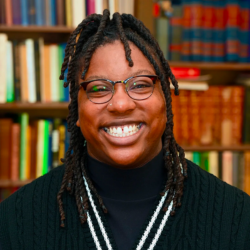
Please join the Race, Ethnicity, and Politics Workshop as they host Monique Newton, a Political Science Ph.D. candidate at Northwestern University.
"Body of Lies: Collective Memory, Traumatic Events, and Collective Action during the Black Lives Matter Movement" revisits the findings of Harris (2006) regarding collective memory and its impact on collective action, given the emergence of a new social movement in the United States: Black Lives Matter. Harris (2006) presents a theory of how shared memories of significant historical events influenced Black activism during the modern Civil Rights Movement. Events can catalyze collective action through social appropriation, a causal mechanism that allows challengers to employ information to interpret whether environmental conditions pose an opportunity or a threat to collective action. Harris (2006) calls the individuals with appropriation power “political entrepreneurs.” This article explores how political entrepreneurs appropriate events and collective memories for collective action in the Black Lives Matter Movement. I examine four case studies of police killings in the United States. I employ interviews with Black Lives Matter local chapter leaders nationwide and archival analyses of historical accounts to establish whether or not a collective memory of police killings for Black Americans in the 21st century exists. Like Harris (2006), I examine how geographical proximity to killings impacts the memory of each event. The four case studies include the killing of Oscar Grant in 2009 in Oakland, California; Trayvon Martin in 2012 in Sanford, Florida; Rekia Boyd in 2012 in Chicago, Illinois; and Mike Brown in 2014 in Ferguson, Missouri. I hypothesize that the nature of the political entrepreneur has changed immensely since the 1960s. Social media and video have emerged as two key ways movement actors frame traumatic events, such as police killings, to spur collective action.
Monique Newton (she/her) is a 5th-year Ph.D. Candidate in the Political Science Department at Northwestern University. Her primary subfield is American Politics and her second subfield is methods. Her research interests lie at the intersection of race and ethnic politics, urban politics, political behavior, and political psychology. A mixed-method scholar, she employs ethnographic, interview, survey, and experimental methods to examine Black political behavior in American cities in the United States. She currently resides in Chicago, IL.
Audience
- Faculty/Staff
- Graduate Students
Interest
- Academic (general)